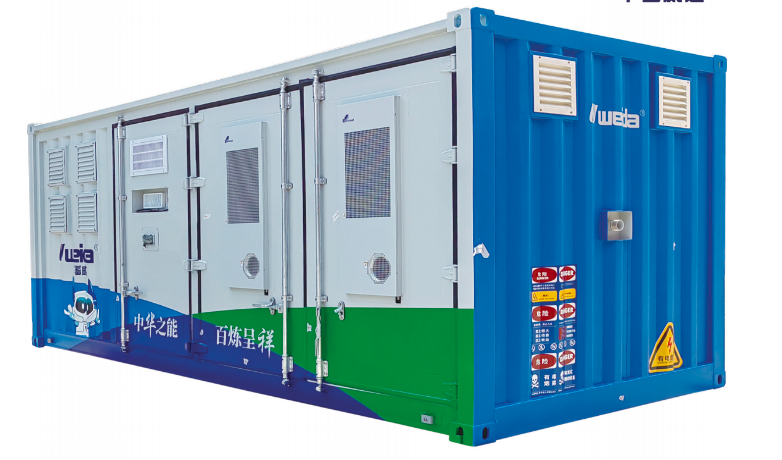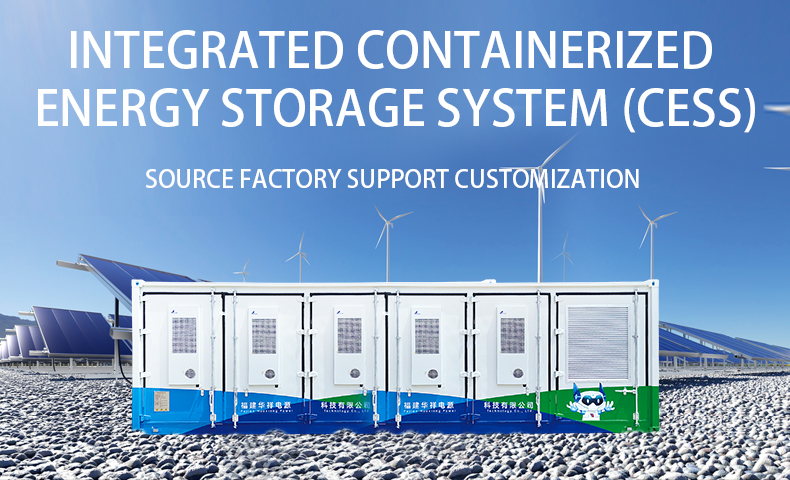Description

The integrated container energy storage system consists of battery clusters, bidirectional power conversion systems (PCS), battery management systems (BMS), energy management systems (EMS), fire protection systems, lighting systems, dynamic environmental control systems, access control systems, isolation systems, etc. Transformers (optional), etc. The system status is subject to multiple monitoring and hierarchical linkage, forming a comprehensive protection system that integrates electrical safety and functional safety. Container system, standardized and prefabricated design, reduces customization time and construction costs, and reduces safety hazards caused by local installation differences and management risks. Meet the application needs of regional power grid peak shaving, frequency regulation, voltage regulation, emergency response, and new energy consumption,

System components
Lithium battery pack
The main components of the system are a battery module composed of safe, efficient, and long-life lithium iron phosphate cells connected in series, and a battery cluster composed of multiple modules connected in series.
Battery management system
The core components of the system effectively protect the battery from overcharging, discharging, overcurrent, and other impacts, while also managing the battery cells in a balanced manner to ensure the safe, reliable, and efficient operation of the entire system.
Monitoring system
System operation data monitoring, operation strategy management, historical data recording, system status recording, etc
PCS power conversion system
The bidirectional AC/DC converter can achieve bidirectional conversion between DC to AC and AC to DC. It can convert AC to DC for battery charging, as well as DC to AC for load power supply or feedback to the power grid.
air conditioning system
The battery compartment integrates a 1200W industrial air conditioner to ensure smooth operation of the system in different environments and extend its service life.
1P54
The entire system is designed with IP54.
system parameter
System characteristics
Safe and reliable
Preferred LFP routing with rigorous security testing
A graded temperature control strategy from the core to the container, an industrial grade temperature control system.
Comprehensive electrical protection: high and low voltage separation, insulation detection, grounding protection, and lightning protection design.
7mm thermal isolation between core wires, insulated support design
Module built-in aerosol fire prevention measures, intelligent container level fire prevention, hierarchical linkage, and multi-layer protection
The battery pack is connected in series with the PCS to eliminate circuit current and provide higher safety.
Intelligent and efficient
Efficient, digital, and intelligent EMS system design
0.5C charging/discharging rate
• Fault prediction, identification, and rapid localization
Multidimensional integration
Convenient transportation, installation, and maintenance
Modular design, easy to maintain, manage, and expand
Frequently asked questions
How is the early warning of the security system implemented?
BMS Level 3, Level 1 warning, Level 2 alarm power down, Level 3 power off; Temperature, smoke, and combustible gas detection, using propane for fire extinguishing, as well as remote and on-site alarms, far-infrared video monitoring and recording.
How is ultra-high voltage converted into power supply voltage?
Within the enterprise, the ultra-high voltage of the city power is converted into power supply voltage through substations or transformers, providing normal equipment usage and energy storage devices.
Warranty issues, cycle times issues, how many cycles can a normal battery cycle?
The warranty period is 5 years, with the first three years being free, and the second two years being charged for accessory costs and travel expenses; The normal cycle life of the battery is 6000 times
The normal cycle life of the battery is more than 6000 times, and it can be used for more than 15 years after charging and discharging once a day, and for more than 8 years after charging and discharging twice.
How to maximize the efficiency of two charges and two discharges?
The valley peak and flat peak (fully charged and discharged) maximize system utilization.
What are the configuration facilities for storage cabinets?
It consists of a battery pack, battery management system BMS, energy storage converter PCS, energy management system EMS, fire protection system, monitoring system, and other related auxiliary systems.
The system, monitoring system, and other related auxiliary systems are small in size, large in storage capacity, and resistant to high and low temperatures.
What are the benefits of energy storage cabinets?
(1) Cut peak and fill valley, utilize the difference in peak and valley electricity prices, and save over 60% of electricity bills.
(2) Not affected by power outages or restrictions, and not affecting normal production.
(3) State subsidies and enterprise income tax equipment credits.
(4) Emergency preparedness and standby.
(5) Reduce carbon emissions, connect to the grid for operation, benefit all, make data public and transparent, and monitor and calculate the national power grid.
(6) Lithium iron phosphate batteries will not cause thermal runaway, explosion, or fire.
What is the actual floor area required for energy storage cabinets, 20 feet, and 40 feet?
(1) The size of a 20 foot container is 6.058 * 2.438 * 2591 meters; The dimensions of a 40 foot container are:
12.192 * 2.438 * 2591 meters (reserve a 1.5-2 meter position around the box for maintenance).
(2) The indoor installation of 100kW-215kWh distributed energy storage cabinets covers an area of 3m and weighs approximately 2.5T, with a small footprint designed side by side on three sides. This cabinet is designed according to the requirements of outdoor cabinets and can be placed in an open space outside the power distribution room.
Is there an annual maintenance fee for the storage cabinet?
Roughly calculated, for every 1 megawatt hour, the maintenance cost is about 10000 yuan. The maintenance cost is relatively low in the first 3-5 years, and after five years, the maintenance cost is about 0.5-2% of the cost of the entire equipment; (Investing in a 1WKH energy storage cabinet, with an investment cost of approximately 1.45 million yuan, and maintenance costs of approximately 7000 to 28000 yuan after five years, depending on the degree of aging on site)
Photovoltaic parameters
Maximum photovoltaic power: 400KW
Rated current: 606A
Rated input voltage: 3W+N+PE, 380/400W
Rated frequency: 50/60
AC parameters (grid connection)
Rated output power (kW): 500
Maximum output power (k): 550
Rated grid voltage (V): 3W+N+PE, 380/400V
Grid voltage range: -15%~+10%
Rated grid frequency (Hz): 50/60
Grid frequency range (Hz): ± 2
Output current harmonic: ≤ 3% (rated power)
DC component:<0.5% In
Power factor: -0.9~+0.9
Overload capacity: 105%]: Continuous operation, (105%~120%]: 10 minutes, 120%): Stop operation
Communication parameters (off grid)
Rated output power (kW): 500
Maximum output power (kW): 550
Rated output voltage (V): 3W+N+PE, 380/400V
Output voltage harmonics: 3% (linear full load)
Rated frequency (Hz): 50/60
Overload capacity: 105%]: Continuous operation, (105%~120%]: 10 minutes, 120%): Stop operation
Battery parameters
Battery type: lithium iron phosphate
Single battery cabinet power: 215.04
Number of battery cabinets: 5
Battery system power (kWh): 1075.2
Rated working time (h): 2 (the number of battery modules can be changed to meet the time option)
Battery life: 25 ℃, 0.5C/0.5C, 100% DOD, SOH80% ≥ 6000 times
efficiency
Maximum efficiency: 93%
guarantee
AC switch: Yes
Photovoltaic electric AC switch: Yes
Grid monitoring: Yes
Surge protection: Yes
Basic parameters
Dimensions (width * depth * height) (mm): 6058 * 2438 * 2591
Weight (kg): 16000
Isolation method: built-in isolation transformer
Grid connected and off grid converter: STS
Protection level: outdoor IP54
Working temperature range: -20~55 ° C (>45 ° C derating)
Relative humidity (non condensing): 0-95%
Temperature control method: refrigeration
Maximum working altitude (meters): 4000 (>2000 derating)
Display: touch screen
Communication interface: R $485, CAN. local area network
Communication protocol: Modbus RTU. Modbus TCP. CAN2.OB



Reviews
There are no reviews yet.